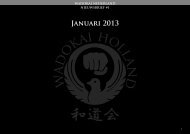ohtsuka hironori sensei founder of wadoryu - Wado ryu Ishikawa ...
ohtsuka hironori sensei founder of wadoryu - Wado ryu Ishikawa ...
ohtsuka hironori sensei founder of wadoryu - Wado ryu Ishikawa ...
Create successful ePaper yourself
Turn your PDF publications into a flip-book with our unique Google optimized e-Paper software.
Sensei N. <strong>Ishikawa</strong> +1942 - 2008.<br />
I dedicate this book “<strong>Wado</strong> No Michi” to my friend and father; <strong>Ishikawa</strong><br />
<strong>sensei</strong>. His immense love, persistence and discipline for <strong>Wado</strong> Karate<br />
in its many facets convinced me to publish this book together with my<br />
colleague A.J. van Dijk. My fathers energetic contribution to karate is both<br />
nationally and internationally admired and deserves all commendation.<br />
I am very happy that this book “<strong>Wado</strong> No Michi” is published and that it is<br />
now available for everybody. A book for Karateka’s and all that are<br />
interested in this dynamic style <strong>of</strong> karate. I would like to thank all people<br />
that have helped realise this book for their contribution and dedication,<br />
especially A.J. van Dijk.<br />
Every day I am still grateful that my father teached me Karate from my<br />
sixth year onwards. As a child, I had to do the heavy basic Ido kihon<br />
training that I had to repeat again and again. I have a pragmatic mentality<br />
and this is something you can see in my karate. Basic skills are extremely<br />
important and I use these <strong>of</strong>ten during my instruction lessons in the dojo.<br />
For me, karate is a life style and it has formed me to the person I am today.<br />
Next to my work in the dojo, I work for the Dutch police organization. In<br />
this work I can put my karate knowledge and skills into practice.<br />
Whatever the future may bring us, I have good<br />
hope for the further developments in <strong>Wado</strong> Karate.<br />
Hereby, I would like to express my wish that my<br />
two sons follow in the footsteps <strong>of</strong> their father and<br />
especially their grandfather: karateka’s in heart and<br />
soul. In any case I will follow my father’s example.<br />
I am convinced that this book will contribute to all<br />
practitioners <strong>of</strong> this efficient and dynamic art.<br />
Lastly I wish you a lot <strong>of</strong> reading pleasure!<br />
Hiroki <strong>Ishikawa</strong>. Rotterdam, Netherlands<br />
The first book written in English about wado karate was published in 1965 by the late Tatsuo<br />
Suzuki 8th dan Hanshi. Prior to this publication the only books printed on <strong>Wado</strong> were by<br />
the <strong>founder</strong> Hironori Ohtsuka which were written in the Japanese language. The <strong>founder</strong>’s<br />
book on <strong>Wado</strong> kata was later translated to English but left a lot to be desired with incorrect<br />
translations.<br />
I have followed the <strong>Wado</strong> way since 1969 and believe <strong>Wado</strong> karate is probably the least<br />
published in all the styles <strong>of</strong> karate. I can never understand why more experienced<br />
practitioners <strong>of</strong> <strong>Wado</strong> have not published their works and experiences. I have <strong>of</strong>ten heard is<br />
said by the <strong>Wado</strong> Hierarchy “you cannot learn <strong>Wado</strong> from a book; the only way is by correct<br />
diligent practise”. This is true on many levels, but I feel everyone needs written reference to<br />
progress; our studies in <strong>Wado</strong> have to be physical but also supported by the written word.<br />
I first met A.J. van Dijk many years ago at a Federation <strong>of</strong> European Championships which<br />
was held in London, England. He was competing and traveling with his long time teacher<br />
<strong>Ishikawa</strong> <strong>sensei</strong>. A.J.’s thirst for knowledge was apparent even in his younger years, always<br />
questioning, always probing into the deeper learnings <strong>of</strong> <strong>Wado</strong>.<br />
A.J.’s teacher and mentor <strong>Ishikawa</strong> <strong>sensei</strong> sadly passed away 4 years ago. This passing greatly<br />
affected him and for a while his direction in <strong>Wado</strong> was suspended in a state <strong>of</strong> uncertainty.<br />
He finally decided, after a lot <strong>of</strong> deliberation, to follow the <strong>Wado</strong>kai way and along with the<br />
teaching <strong>of</strong> Nobuyuki Nukina <strong>sensei</strong> and the mentoring <strong>of</strong> Kuniaki Sakagami <strong>sensei</strong><br />
refound his direction.<br />
Over his years <strong>of</strong> study A.J. was diligent in<br />
collecting information from many sources and<br />
studying the slightly different interpretations that<br />
can occur within the <strong>Wado</strong>kai – <strong>Wado</strong><strong>ryu</strong> – <strong>Wado</strong><br />
Kokusai way. He has painlessly researched and<br />
cross referenced these differences within the three<br />
main styles <strong>of</strong> <strong>Wado</strong>, his clear interpretations and<br />
explanations <strong>of</strong> <strong>Wado</strong> technique are clearly shown<br />
in this publication.<br />
We have a saying in England “everyone who has<br />
lived has a book with in them”. I for one applaud<br />
A.J’s book and feel this will be the first <strong>of</strong> many on<br />
the Way <strong>of</strong> <strong>Wado</strong>.<br />
Peter May. UK



